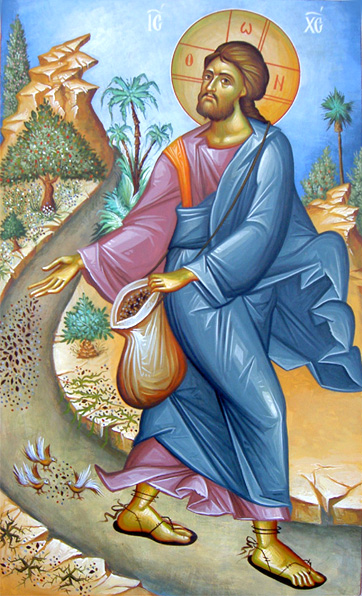Sexagesima Sunday
 Attend to the Antiphons
Attend to the Antiphons
If you would enter deeply into the liturgy of any given Sunday, attend closely to the antiphons. The Magnificat Antiphon at First Vespers of Sunday (on Saturday evening) is a preview of the First Lesson of Matins; the Magnificat. This morning we read the account of Noe and the ark in Genesis 5:31–6:15. Last evening we already sang:
Ant. Dixit Dominus * ad Noë: Finis universae carnis venit coram me: fac tibi arcam de lignis laevigatis, ut salvetur universum semen in ea.
The Lord said unto Noah: * The end of all flesh is come before Me, make thee an ark of planed timber, that seed of all flesh may be saved therein.
The Ark and the Heart of Jesus
The ark by means of which God saves “the seed of all flesh” foreshadows the perfect ark that is the Heart of Jesus, open to all who seek salvation. Already on Sexagesima Sunday, the liturgy points to the “heart” of the Passion of Saint John that will be chanted on Good Friday: “But one of the soldiers with a spear opened his side, and immediately there came out blood and water” (John 19:34). At Matins on the feast of the Sacred Heart of Jesus we will sing of the same mystery:
Ex corde scisso Ecclesia
Christo jugata nascitur:
Hoc ostium Arcæ in latere est:
Genti ad salutem positum.
O wounded Heart, whence sprang
The Church, the Saviour’s bride;
Thou Door of our Salvation’s Ark
Set in its mystic side.
During Septuagesimatide, as during Lent itself, not only the Benedictus and the Magnificat of Second Vespers, but also the Little hours (Prime, Tierce, Sext, and None) have antiphons of their own drawn from the Gospel of the Day. This is the Church’s way of keeping the Gospel of the day before our eyes, and in our ears, and in our hearts.
At the Benedictus:
Ant. Cum turba * plurima convenirent ad Jesum, et de civitatibus properarent ad eum, dixit per similitudinem: Exiit qui seminat, seminare semen suum
Ant. When much people were gathered together to Jesus, * and were come to Him out of every city, He spoke by a parable: A sower went out to sow his seed.
Docile to the Holy Ghost
If you would hear the word of Jesus, you must first allow yourself to be gathered to Him; this is the work of the Holy Ghost in every soul docile to His inspirations.
No man can come to me, except the Father, who hath sent me, draw him; and I will raise him up in the last day. It is written in the prophets: And they shall all be taught of God. Every one that hath heard of the Father, and hath learned, cometh to me. (John 6:44–45)
The Father draws us to the Son by the secret operations of the Holy Ghost; similarly the Father teaches us inwardly by the Holy Ghost.
But when he, the Spirit of truth, is come, he will teach you all truth. For he shall not speak of himself; but what things soever he shall hear, he shall speak; and the things that are to come, he shall shew you. He shall glorify me; because he shall receive of mine, and shall shew it to you. (John 16:13–14)
Mothers of the Word
Jesus Himself is the Sower who comes out from the Father; He is also the seed, sowing Himself by means of His word. The soul who receives the word of Jesus conceives Him inwardly, becoming to Him even a mother, according to what He says in the sequel to today’s Gospel: “My mother and my brethren are they who hear the word of God, and do it” (Luke 8:21).
At Prime:
Ant. Semen cecidit * in terram bonam, et attulit fructum in patientia.
Ant. The seed fell * upon good ground, and brought forth its fruit in patience.
The Most Pure Heart of Mary
In the Mectildian–Benedictine calendar, February 8th, is the feast of the Most Pure Heart of Mary. (This date was aptly chosen in the 17th century in relation to February 2nd, on which day we read Simeon’s prophecy [Luke 2:35] concerning the Heart of the Mother of God: “And thy own soul a sword shall pierce, that, out of many hearts, thoughts may be revealed”.) The Most Pure Heart Mary emerges from the proper texts of Sexagesima Sunday in a wonderful way. The Virgin Mary’s immaculate Heart is the “good ground” of the Gospel. Thus do we sing every morning in Psalm 66 at the beginning of Lauds, making reference to the Mother of God, Terra dedit fructum suum, “The earth hath yielded her fruit” (Psalm 66:7).
At Tierce:
Ant. Qui verbum Dei * retinent corde perfecto et optimo, fructum afferunt in patientia.
Ant. They who keep * the word of God with a good and perfect heart, bring forth fruit in patience.
At Sext:
Ant. Semen cecidit * in terram bonam, et attulit fructum, aliud centesimum, et aliud sexagesimum.
Ant. Some seed fell on good ground, * and bare fruit, some one hundred-fold, and some sixty-fold.
At None
Ant. Si vere, fratres, * divites esse cupitis, veras divitias amate.
Ant. If then, dearly beloved brethren, ye seek to be rich, * earnestly desire the true riches.
At the Magnificat of Second Vespers:
Ant. Vobis datum est * nosse mysterium regni Dei, ceteris autem in parabolis, dixit Jesus discipulis suis.
Ant. Jesus said to His disciples: * Unto you it is given to know the mysteries of the kingdom of God, but to others in parables.
